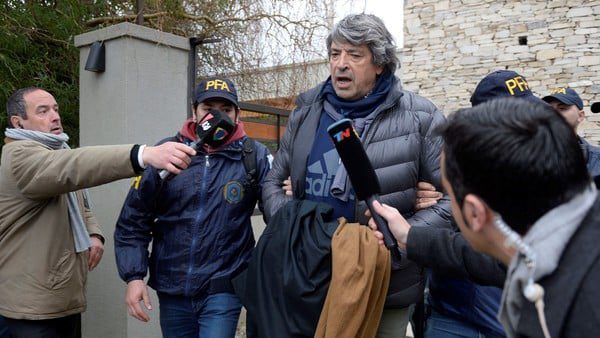Global Courant 2023-04-15 02:34:03
Just over a month after being sentenced to seven years and 10 months for being part of a gang dedicated to robberies and fraud, former judge Ricardo César Melazo (61) was released with assisted liberty and this Friday he returned to his house on the outskirts from La Plata.
As confirmed to Clarín in the courts of La Plata, the court that granted the benefit took into account for the calculation of the sentence the training and education courses that the former magistrate took while he was detained in prison No. 31 of Ezeiza.
On March 6 of this year, Melazo was accused of being part of a “mega gang” of criminals, police officers and criminal magistrates who were engaged in “escruches” (robbery in empty properties), fraud and assaults in the area of the Buenos Aires capital.
He was arrested in August 2018, in a property in the north of the Buenos Aires capital. The oral court that tried him understood that he was one of the pillars of the association that would have operated with these criminal actions “at least” between 2010 and 2015.
Other actors from the organization prosecuted in this case received these sentences: for former commissioner Gustavo Bursztyn, 7 years; for the former officer Gustavo Mena, 6 years in prison; for Adrián Manes, 4 years and 6 months and for Carlos Bertoni, 4 years in prison. Unanimously, the court sentenced Enrique “Quique” Petrullo to 4 years in prison for influence peddling.
Policeman Bursztyn was released at the beginning of April. He spent Easter with his family, after the defenders Marcelo Peña and Gisela Magalí Fromet demanded that a calculation of the sentence applied be made, although it is not firm. And the Court agreed to the release.
In this way, those responsible for the alleged illegal association (a former judge and a former commissioner) who would have obtained multiple loots in robberies were released.
The release request for Melazo was requested by the lawyers Juan Pesquera and Cristian Romano a little less than a month ago. They demanded that the “educational stimulus institute” be applied -in response to the numerous courses carried out- and that freedom be ordered.
As Pesquera explained to Clarín, the former magistrate “served more than 5,000 teaching hours in prison. He completed courses in computer science, automotive mechanics, training students in gender policies, mathematics, job security, among others ”. All academic offers available at the Ezeiza federal complex.
However, they were not the only courses he took. According to the ruling, Judge Silvia Hoerr, who voted in dissent, also took “ukulele courses at home”, “pawns to kings-advanced chess course”, “Tai Chi Chuan course for health”, “classes on keyboard at home”, “Budanjin Chin kung course for health” and “our own seeds”.
The judge also highlighted, “many of them carried out virtually, dictated by the University of Córdoba, without requiring more effort than sitting in front of a computer in order to add hours and obtain different certificates, far from the spirit and desire to learn that follow the law.”
Melazo was detained in a special pavilion that has half of the population made up of women with children or pregnant women and in the other sector houses former repressors and people who have ties to politics or are imprisoned for reasons of state corruption.
The ruling that granted the release “under the terms of assisted release” was divided. Judges Santiago Paolini and Andrés Vitali accepted the defense’s claim. And Judge Hoerr turned it down.
The benefit was granted because since he was arrested the former judge has served two thirds of the sentence set by the court. Strictly speaking, he lacked 45 days for those two thirds: but those days were replaced by his attendance at the courses. With this equation: each year of completion, 10 “extra” days of prison are computed. And Melazo attended the training in the four and a half years he spent in the cells.
As explained by Pesquera, the now released man had already obtained another procedural benefit. Since the end of March, he had the possibility of accessing “transitory releases”, which are obtained when the prisoner is close to parole and meets some behavioral requirements within the prison. Melazo was able to see the light without the interruption of the prison walls the last weekend of March and a week ago. It took 24 hours, plus three to go and another three to return to his place of confinement.
Melazo’s judicial journey began in the 1990s, when he served for almost a decade as a prosecutor in the La Plata jurisdiction. With the reform of the provincial system, he competed for judge and took charge of the Court of Guarantees 2. Interim in cases of public impact and always maintained a high level of exposure.
His positioning brought him closer to politics. In La Plata, the celebration of his 50th birthday is remembered because in his country house in Gorina he brought together officials, ministers and legislators close to then-governor Daniel Scioli. He also to local businessmen and journalists with relevant anchorage in the provincial capital.
He went one step further: in 2015 he positioned himself as one of the possible security ministers in the event that the then-governing candidate of the ruling party, Aníbal Fernández, won the elections.
He had resigned from his position as a criminal judge in June 2017, when they began to target him for this investigation, which was led by prosecutor Betina Lacki. He did it to avoid being subjected to a jury (political trial for magistrates).
Lacki came to Melazo after investigating the death of a thief, Juan Farías. They would have murdered him in a reckoning. He was one of the members of the gang. That he operated like this: he deployed his actions in areas of the center and the periphery of the provincial capital. Indications of crimes committed between 2012 and 2015 were found, although there could be more.
Robbers with criminal records and swollen bars were the “labor.” They stole, assaulted, reduced cars. They scammed. Police from the DDI and from downtown sections carried out coverage and released the areas, if necessary. If something went wrong, the role of judicial officials came into play. They facilitated and expedited files so that they could recover their freedom or so that the possible parties involved could access procedural benefits.
That’s where Melazo came into play. And other officials who also ended up in prison, such as former prosecutor Tomás Morán.
The Silver. correspondent
PS








